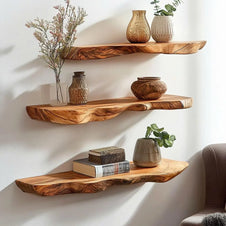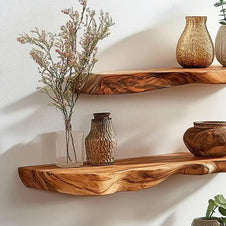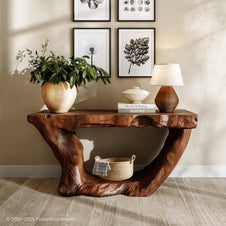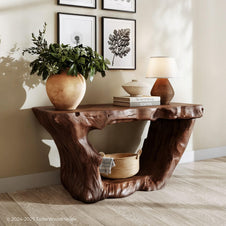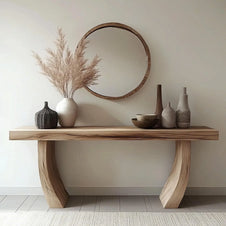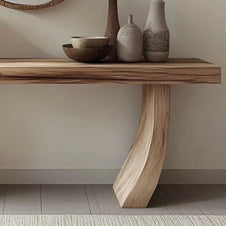When furnishing your home, choosing the right coffee table is crucial. A common question homeowners face is, "How high should my coffee table be?" This isn't just about finding a spot for your mug; the coffee table's dimensions significantly affect both comfort and the overall look of your living area.
This thorough guide is designed to help you. We'll answer "how high should your coffee table be," explain its crucial relationship with your sofa, delve into ideal length, width, and shape, and provide practical tips for choosing a table that perfectly fits your style and budget. By the end, you'll feel confident making an informed decision, leading to a living room that's balanced, functional, and truly inviting.
How High Should Your Coffee Table Be?
Let's start by directly addressing the main question that homeowners often ponder: "how high should your coffee table be?" Understanding this basic standard provides a solid starting point for selecting the ideal piece for your living space.
The Standard Height Range
Most commonly, coffee tables fall between 16 to 18 inches tall. This range is widely accepted as the answer to "how high should your coffee table be" for most living rooms. It's the sweet spot you'll find in the majority of furniture stores and design catalogs because it works well with typical sofa sizes.
However, keep in mind that coffee table heights can vary to fit different styles and needs:
-
Lower tables, typically 10-15 inches high, are popular in modern or minimalist spaces, offering a relaxed feel and making rooms appear larger.
-
Taller "cocktail tables," around 20-21 inches, are sometimes chosen for more formal settings, providing a convenient surface for guests who may be standing or sitting in upright chairs.

Choosing a standard-height table, such as this one, means it will seamlessly blend in and be highly functional in any room.
The Logic Behind The Standard Height Range
The 16-18 inch coffee table height is a deliberate design, focusing on functionality, visual harmony, and ergonomics. This explains why "how high should your coffee table be?" is a crucial question.
-
Functionality: This height allows for easy, natural reach from a standard sofa, making daily interactions effortless.
-
Visual Harmony: It aligns beautifully with most sofa seat heights, creating a cohesive and balanced living room aesthetic. This is why knowing "how high should your coffee table be?" is so important for aesthetics.
-
Ergonomic Benefits: The correct height reduces uncomfortable bending and reaching while maintaining clear sightlines. This ease of movement and clear sightline is a big part of why "how high should your coffee table be?" matters for everyday use and overall room comfort.
Relation Between Coffee Table Height and Sofa
Knowing "how high should your coffee table be" is crucial, but the key to a comfortable and visually pleasing living space is matching your coffee table's height to your sofa. This relationship is the most critical design guideline.
The Golden Rule: The "1-2 Inch Lower" Principle
Your coffee table should ideally be 1 to 2 inches lower than the top of your sofa cushions (when compressed as if someone is sitting on them). This height difference ensures:
-
Comfort and Ease: Allows for a natural, comfortable reach to items and is perfect for propping up your feet.
-
Visual Cohesion: Creates a unified and balanced look for your entire seating area.

This table exemplifies applying the rule: its height adjusted to the sofa creates harmony in the seating arrangement. You should use this rule when choosing your coffee table.
Length Considerations
Beyond "how high should your coffee table be," its length is crucial for fit, function, and aesthetic harmony. This dimension significantly impacts room flow and seating usability.
The "Two-Thirds" Rule for Length
A good guideline is that your coffee table should be about two-thirds the length of your sofa. For instance, a 90-inch sofa would ideally go with a 60-inch table. This proportion anchors the seating without overwhelming it, providing accessible surface area and maintaining visual balance.
Impact of Length on Functionality and Flow
-
Too Short: Can look undersized and fail to serve guests comfortably.
-
Too Long: May cramp the seating area, obstruct pathways, or extend awkwardly past the sofa arms.
Width Considerations
Separate from length, the width of your coffee table plays a crucial role in balancing the space and ensuring comfortable navigation. While you've considered "how high should your coffee table be," neglecting width can disrupt your room's flow.
Balancing Width with Room Size
The coffee table's width should be proportionate to your sofa's depth and the room's overall size. Too wide a table in a narrow room can make the area feel cramped and hard to navigate, impeding comfortable movement.
Impact on Traffic Flow and Aesthetics
-
Hindering movement: An overly wide table can create bottlenecks, making the room feel cramped and smaller.
-
Visual Weight: A very wide table, even if appropriately long, can look bulky and dominate the space, especially in smaller rooms, regardless of "how high should your coffee table be." A well-chosen width ensures the table fits seamlessly, not as an obstacle.
Shape Considerations
Your chosen shape impacts dimensions, function, and aesthetics, subtly influencing how the table feels in relation to "how high should your coffee table be."
Rectangular Tables
-
Best For: Large sofas and sectional pieces.
-
Benefit: Provide expansive surface, serving multiple seats. Often align with standard "how high should your coffee table be."
Square Tables
-
Best For: Square seating (e.g., L-shaped sectionals, four chairs).
-
Benefit: Great for central anchoring and defining seating areas.
Round & Oval Tables
-
Best For: Small spaces, high-traffic areas, or angular rooms.
-
Benefit: Safer (no sharp corners), easier to navigate. Their curves soften rigid furniture, and a lower profile can subtly influence "how high should your coffee table be" for a casual feel.

Among the many table shapes available, this live-edge table, featuring quality wood and precise dimensions, could be an ideal fit for your living room.
Tips on choosing suitable coffee table with your style and budget
This section brings together all the dimensional considerations, including "how high should your coffee table be," with practical advice on integrating style, function, and budget into your final coffee table decision.
Functionality First
Consider how you'll use it. For casual dining or work, look for lift-top mechanisms or tables at the higher end of the 16-18 inch range. Also, think about built-in storage for clutter.
Harmonizing with Your Home's Style
-
Materials: Choose materials (wood, metal, glass) that complement your existing decor. The material, along with "how high should your coffee table be," defines its presence.
-
Design Trends: Modern designs often favor lower tables for openness, influencing "how high should your coffee table be" for contemporary homes. Match your room's style (traditional, minimalist, etc.).
Smart Shopping & Budget
-
Prioritize Quality: Invest in durable pieces for long-term value.
-
Look for Value: Explore sales or second-hand markets.
-
Define Your Budget: Set a clear budget range before shopping.

Finding a coffee table that's budget-friendly, well-made, and the right size for your living room is tough. But this Solid Wood Slab Coffee Table could be exactly what you need. Learn more by clicking here.
Measuring and Visualizing
This crucial step ensures you understand "how high should your coffee table be" in your space.
-
Measure Accurately: Measure your sofa's compressed seat height and length, then the table's exact floor area, accounting for all clearances (14-18 inches from sofa, 30 inches for walkways). This is crucial for confirming "how high should your coffee table be" and other dimensions.
-
Visualize: Use painter's tape or cardboard cutouts to visualize the table's footprint and scale in your room.
-
Online Shopping Caution: Always check "H," "W," and "L" dimensions meticulously, especially "how high should your coffee table be."
-
Adjustable Features: Consider tables with adjustable levelers or lift-tops for versatility.
Avoiding Common Sizing Mistakes
-
Disproportionate Size: Avoid tables too small or too large for your sofa.
-
Impacting Traffic Flow: Don't choose a table too wide for the room; it can impede movement.
-
Ignoring Room Dimensions: Consider the entire room's footprint for overall balance.
Conclusion
Choosing your ideal coffee table goes beyond just "how high should your coffee table be." You now know its optimal height—1 to 2 inches lower than your sofa—is crucial for comfort and visual harmony. Equally vital are its length, width, and shape, which impact room flow and balance. For more insight about coffee table sizes, you can further research on Froy.
By following the two-thirds rule for length, ensuring proper clearance, and thoughtfully selecting a shape, you'll create a cohesive design. Always prioritize functionality, match your style, and measure before buying. Armed with this knowledge, you're ready to confidently pick a coffee table that enhances your home's comfort, style, and inviting atmosphere, knowing you've made the perfect choice based on "how high should your coffee table be" for your unique space.

